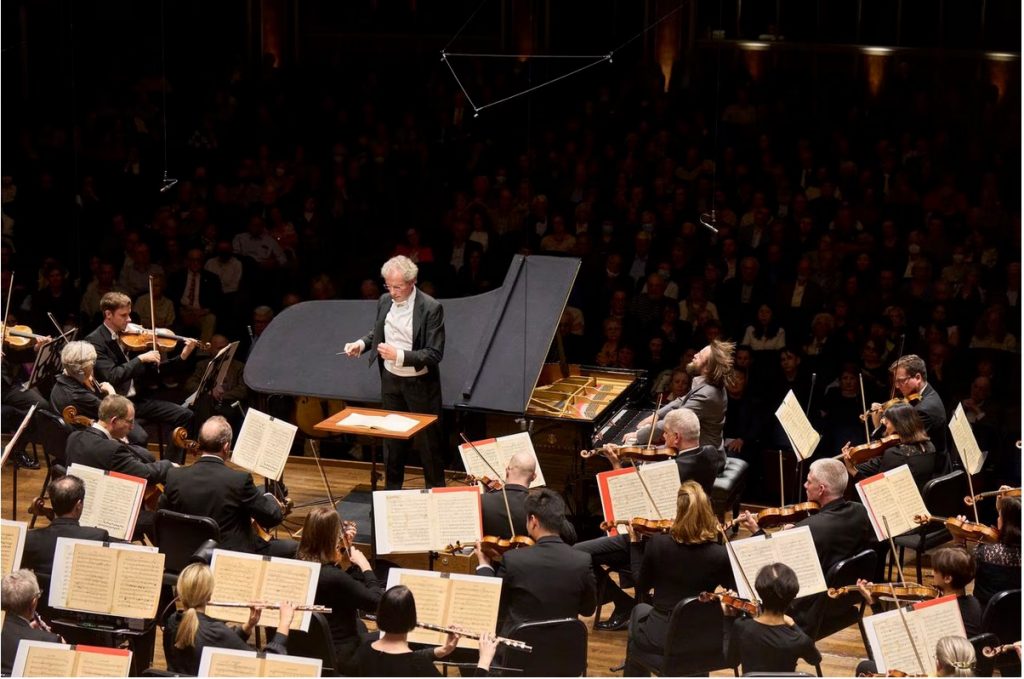By Daniel Hathaway
On Saturday, a 3pm Baldwin Wallace Faculty Recital features J.R. Fralick, tenor, Christine Fuoco, piano, and Khari Joyner, cello, a 4pm Stars in the Classics classical cabaret at Praxis Fiber Gallery includes dance and the first performance of a work inspired by memories of Euclid Beach Park, and a 7:30 performance by Les Délices and Kaleidoscope Vocal Ensemble in Kulas Hall at CIM repeats Friday’s program, “The Pow’r of Music.”
On Sunday, The Cleveland Orchestra repeats its season opener at 3pm with Franz Welser-Möst on the podium and Daniil Trifonov at the Steinway (pictured — read our review on Cleveland.com here), new music director Kevin Jones plays a 4pm organ recital at St. Paul’s Episcopal Church in Cleveland Heights, and at 6pm, CIM celebrates the life and compositions of its celebrated alumna Dolores White.
Check our Concert Listings for details of these and forthcoming events.
WEEKEND ALMANAC:
SEPTEMBER 30
Today marks the anniversaries of the birth of Irish composer and organist Charles Villiers Stanford (1852) and Russian violinist David Oistrakh (1908), and the death of American composer and music critic Virgil Thomson (1989).
A couple of local performances celebrate those musicians. Here, Quire Cleveland sings Stanford’s motet Beati quorum via under guest conductor Tim Brown at Trinity Cathedral in 2011. And here, Oistrakh joins George Szell and The Cleveland Orchestra in a 1969 recording of Brahms’ Violin Concerto.
In 2020, the Metropolitan Opera presented Thomson’s The Mother of Us All (libretto by Gertrude Stein) in a collaboration with The Juilliard School and the New York Philharmonic on the eve of American social reformer and women’s rights activist Susan B. Anthony’s 200th birthday. Watch the video here.
OCTOBER 1
Two American institutions were launched on the first day of the tenth month. In 1921, American choral conductor Margaret Hillis was born in Kokomo, Indiana, and three years later, the Curtis Institute of Music opened its doors in Philadelphia.
Margaret Hillis an institution? Like her mentor, Robert Shaw, the founder and first conductor of the Chicago Symphony Chorus was somewhat larger than life, and helped establish the tradition of large, professional-quality choruses attached to major symphony orchestras. Lured away from New York City by music director Fritz Reiner (where she had founded the New York Concert Choir), Hillis debuted her new Chicago ensemble in April, 1958, and later that year became the first woman to conduct subscription concerts with the CSO.
Hillis further burnished her reputation — she won nine Grammy Awards during her career — by leading Mahler’s Eighth Symphony in 1977 at Carnegie Hall, stepping in on short notice to replace the ailing Sir Georg Solti.
Writing her obituary in 1998, Alan Kozinn noted,
She had a sense of humor about her struggle for recognition in a profession dominated by men. “There’s only one woman I know who could never be a symphony conductor,” she told The New York Times in 1979, “and that’s the Venus de Milo.”
Click here to watch a 1979 Margaret Hillis interview with John Callaway.
And the Curtis Institute of Music was founded in Philadelphia in 1924 with a $12 million donation from MaryLouise Curtis Bok from the fortune she inherited from her publishing magnate father. The tuition-free school was intentionally designed to be small, admitting only the number of instrumentalists needed to form a symphony orchestra and an opera company, in addition to composers, conductors, pianists, organists, and guitarists.
Curtis sent its 2021 Ensemble to the Kennedy Center’s Millennium Stage in February of 2016 to perform Arnold Schoenberg’s Pierrot Lunaire. Click here to watch the concert and hear introductory remarks by Dean of Artistic Programs David Ludwig, who uses the occasion to talk briefly about the Institute.




